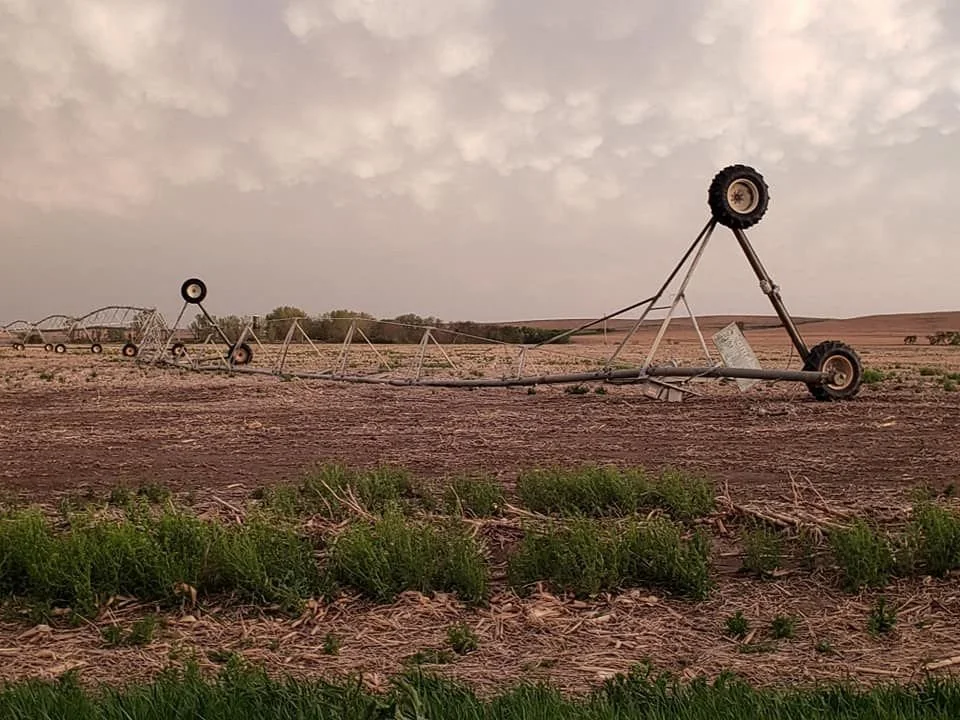Get Prepared During Flood Awareness Week
August 21 to 25 is Louisiana Flood Awareness Week, an opportunity to educate citizens on the many ways to prepare for floods and mitigate future damage.
“Anywhere it can rain, it can also flood,” said Carol Friedland, director of the LaHouse Research and Education Center. “Staying prepared and weather aware during a flood is important to keep Louisiana communities safe.”
Read More
Farmers Taking Loss As Extreme Heat Affects Crops & Could Affect Crawfish
Ray Schexnayder, with Schexnayder & Sons LLC, understands that as much as anyone. He says his farm will be short about 25 to 30 bushels of corn this year. Since corn can be used to help catch crawfish, it could affect how much are caught, and might affect the price next season.
Read More
The Midwest is Set to Bake Under High Heat, Ag Meteorologists Now Worry About Severe Crop Damage
Portions of the Midwest could see the most challenging weather yet this year, and according to leading ag meteorologists, it's creating more concerns for crop conditions. With heat forecast to top 100 degrees, along with little rain in this week’s forecast, crop conditions could deteriorate and the biggest risk in the western Corn Belt.
Read More
Sweltering Summer Could Contribute to Lower Crop Yields
The hot and dry summer we’ve been experiencing is likely to limit the yields for some of the state’s key crops, like rice. Louisiana Rice Specialist Ronnie Levy with the LSU Ag Center said if planted late in the season, anything flowering now could affect pollination.
Read More
The 2023 Atlantic Hurricane Season Is Now Underway. Here's What To Know
It's time for residents along the southeastern U.S. coastlines to make sure their storm plans are in place as the 2023 Atlantic hurricane season gets underway on Thursday.
Forecasters are predicting a “near-normal” season, but Mike Brennan, the new director at the National Hurricane Center in Miami, stressed during a Wednesday news conference that there's really nothing normal when it comes to hurricanes.
Read More
It’s Been a Rainy Week, but Drought Persists in Parts of Louisiana. Here’s Why
Louisiana's months-long drought could be coming to an end soon.
The U.S. Drought Monitor, a collaboration between the National Oceanic and Atmospheric Administration, National Drought Mitigation Center and U.S. Department of Agriculture, has designated most of southeast Louisiana as abnormally dry, with some areas experiencing moderate drought.
Read More
What El Nino Watch Means For Louisiana And Mississippi
An El Niño Watch has been issued by the National Oceanic and Atmospheric Administration (NOAA). Experts at NOAA’s Climate Prediction Center (CPC) that monitor global patterns issue a watch when conditions favor the development of El Niño within the next six months.
Read More
USDA Expands Hurricane Insurance Protection
Farmers may now be eligible for further protection against damaging tropical storms. After hearing directly from agricultural producers, the U.S. Department of Agriculture (USDA) is expanding its Hurricane Insurance Protection-Wind Index (HIP-WI) Endorsement with a Tropical Storm Option. USDA’s Risk Management Agency (RMA) will offer this option for the 2023 crop year.
Read More
Climate Continues to Challenge Agriculture
The average annual temperature of the contiguous United States was 53.4 degrees F, which is 1.4 degrees F warmer than average, ranking in the warmest third of the record.
Annual precipitation for the contiguous United States was 28.35 inches, 1.59 inches less than average, ranking in the driest third of the historical record.
Read More
Low Water Levels on Mississippi River Pose Another Economic Threat
The U.S. supply chain might be on the receiving end of a 1-2 punch that could crater an economy veering toward a possible recession.
In addition to a possible strike by railroad workers, a drought in the Midwest has slowed barge traffic on the Mississippi River, which is at the lowest water levels in 23 years.
Read More
Lower Mississippi River Levels Mean Problems for Farmers and Could Mean Higher Consumer Prices
Due to a month-long lack of rain in the Mississippi Valley, river levels are more than 10 feet below normal, causing cruise ships to run aground and preventing cargo ships and barges from dropping off crops at their destination docks.
Louisiana officials are calling for more dredging of the river to try and ease a problem that they say will wind up costing consumers.
Read More
Rain Is a Good Thing: Farmers Rejoice After Heavy Rain
Most people do not give rain a second thought, but for farmers, it is sometimes all they can think about.
“It’s every day, you go to bed thinking about it at night, you wake up early in the morning way before daylight thinking about it, that’s just a farmer,” said Keith Lacombe, owner of Keith Lacombe Farms.
Read More
Hurricane Predictions Trimmed But Forecasters Still See Busy Season
The National Oceanic and Atmospheric Administration today trimmed its hurricane season outlook from a 65% chance for above normal activity to 60% and increased the odds of a normal season from 25% to 30% because of uneven sea surface temperature, including a patch of cooler water off Portugal. Parts of the Atlantic are warmer than normal, but the variability has forecasters “backing off on the higher end” of their predictions, says lead hurricane outlook forecaster Matthew Rosencrans.
Read More
La Nina May Further Disrupt Commodity Markets via Hurricanes
As if commodity markets needed any more drama this year, this year’s Atlantic hurricane season could be the seventh-consecutive with above-average activity, raising risks for U.S. grain exports as well as oil production and refining capacity.
Significant disruptions for U.S. commodities resulting from hurricanes are more the exception than the rule, but tight global stocks, high prices and geopolitical conflicts could amplify any storm impacts that surface this year.
Read More
Prep For Another Busier Than Normal Hurricane Season With Tips From Storm Experts
South Louisiana is no stranger to hurricanes, but after Hurricane Ida’s destruction last year—16 years to the day since Katrina hit—preparation is more important than ever as the 2022 Atlantic season begins.
Read More















